January 5th History Lesson
1781 – Richmond, Virginia was burned by British naval forces led by Benedict Arnold. American traitor and British Brigadier General Arnold enjoyed his greatest success as a British commander on this day. Arnold’s 1,600 largely Loyalist troops sailed up the James River at the beginning of January, eventually landing in Westover, VA. Leaving Westover on the afternoon of January 4, Arnold and his men arrived at the virtually undefended capital city of Richmond the next afternoon.
Virginia’s governor, Thomas Jefferson, had frantically attempted to prepare the city for attack by moving all arms & other Military Stores records from the city to a foundry five miles outside Richmond. As news of Arnold’s unexpectedly rapid approach reached him, Jefferson then tried to orchestrate their removal to Westham, seven miles further north. He was too late. Arnold’s men quickly reached and burned the foundry and then proceeded towards Westham, which Jefferson had asked the formidable Prussian military advisor Baron Friedrich Wilhelm von Steuben to guard. Finding von Steuben, Arnold chose to return to Richmond, burning much of the city the following morning.
1895 – After being convicted of collusion with a foreign power French army officer Alfred Dreyfus was stripped of his rank and sentenced to life imprisonment on Devil’s Island. Apart from his guards, he was the only inhabitant of the island and he stayed in a 13 ft × 13 ft stone hut. He was later declared innocent of all crimes.
1914 – The Ford Motor Company announced an eight-hour workday and promised it would pay a “living wage” of at least $5 for a day’s labor.
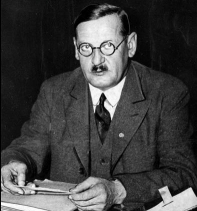
1919 – The German Workers’ Party was founded. Anton Drexler was named chairman, and it was Drexler (shown above) who invited Adolf Hitler to join the party just nine months later. Hitler quickly moved up the leadership ladder. He realized one thing the movement lacked was a recognizable symbol or flag. In the summer of 1920, Hitler chose the symbol which to this day remains perhaps the most infamous in history; the swastika.
In 1921, The German Workers’ Party name was changed by Hitler – by then the undisputed leader of the movement – to include the term National Socialist. Thus the full name was the National Socialist German Workers’ Party (NSDAP) called for short, Nazi.
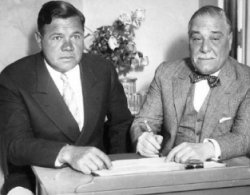
1920 – Jacob Ruppert, co-owner of the the New York Yankees, announced the team’s purchase of outfielder George Herman “Babe” Ruth from the Boston Red Sox for the sum of $100,000. The deal also involved a $350,000 loan from Ruppert to Boson owner Harry Frazee, secured by a mortgage on Fenway Park.
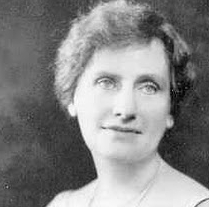
1925 – Nellie Tayloe Ross of Wyoming became the first female governor in the United States. In 1933, she became the first female director of the U.S. Mint, a role she served for 20 years.
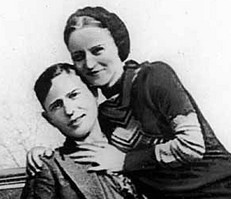
1930 – Bonnie Parker met Clyde Barrow for the first time at Clarence Clay’s house (a friend of Clyde’s) in Dallas. Parker was out of work and was staying in West Dallas to assist a female friend with a broken arm. Barrow dropped by the girl’s house while Parker was in the kitchen making hot chocolate.
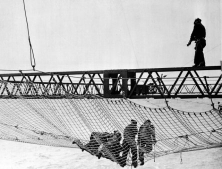
1933 – Construction of the Golden Gate Bridge began in San Francisco Bay. The most conspicuous precaution was the safety net, suspended under the bridge from end to end. During construction, the net saved the lives of 19 men who became known as the “Half Way-to-Hell Club.” Until February 17, 1937 there had been only one fatality, but on that date, 10 men lost their lives when a section of a scaffold, used to spin wire into cable, carrying 12 men fell through the safety net.
It took a little over 4 years to complete and the bridge was open to vehicular traffic on May 28, 1937. At that time it was the longest suspension bridge in the world.
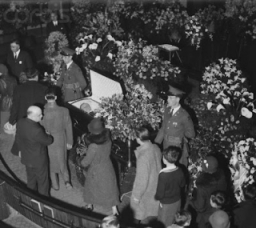
1933 – Calvin Coolidge, the 30th president of the United States, died from coronary thrombosis in Northampton, Mass., at the age of 60. After he left the White House in 1929, Coolidge – a former Governor of Massachusetts – moved to Northampton, MA, but following his death, he was buried in his hometown of Plymouth, VT.
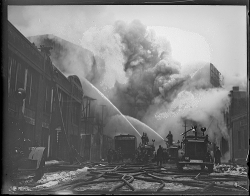
1934 – In Boston, Fenway Park’s ambitious reconstruction suffered a dramatic setback when a five-hour fire burned down most of the newly-constructed left-field grandstand and center-field bleachers.

1939 – Two years after Amelia Earhart (and Fred Noonan) disappeared during an attempt to fly around the globe, she was declared dead.
1945 – Japanese pilots received the first order to become kamikaze, meaning “divine wind” in Japanese. The suicidal blitz of the kamikazes revealed Japan’s desperation in the final months of World War II. Most of Japan’s top pilots were dead, but youngsters needed little training to take planes full of explosives and crash them into ships. At Okinawa, they sank 30 ships and killed almost 5,000 Americans.
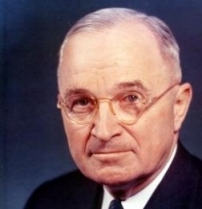
1949 – President Harry S. Truman announced, in his State of the Union address, that every American had a right to expect from our government a “fair deal.” Truman argued for an ambitious liberal agenda based on policies first articulated by his predecessor, Franklin D. Roosevelt. However, the nation’s politics had shifted rightward in the years following World War II and inflation, economic conversion from wartime to peacetime industries and growing anti-communist sentiment provided major obstacles to Truman’s plan. To a growing contingency of conservatives and Southern Democrats in Congress, the Fair Deal smacked of socialism.
Truman managed to convince Congress to pass several of his liberal reforms. It almost doubled the minimum wage – from 40 cents to 75 cents an hour – and established the Housing Act, which provided 800,000 new houses for the poor. Though Congress approved Truman’s extension of Social Security benefits, it rejected the idea of national health care, avoided passing any new civil rights legislation and failed to aggressively tackle concerns over fair labor practices.

1957 – Jackie Robinson, the first African-American to play in Major League Baseball, announced his retirement. After the 1956 season, Robinson had been traded by the Brooklyn Dodgers to the arch-rival New York Giants. The trade, however, was never completed. Unbeknownst to the Dodgers, Robinson had already agreed with the president of Chock full o’Nuts coffee to quit baseball and become an executive with the company. Since Robinson had sold exclusive rights to any retirement story to Look magazine two years previously, his retirement decision was revealed through the magazine, instead of through the Dodgers organization.
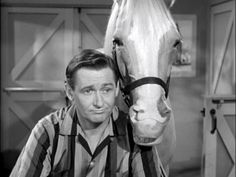
1961 – Mister Ed premiered as a syndicated television series. It was picked up by CBS for its second season and aired on that network from October 1, 1961 to February 6, 1966. It remains one of the few series to debut in syndication and then be picked up by a major network for prime time.
1963 – The San Diego Chargers defeated the Boston Patriots 51-10 in the American Football League championship game. The Chargers’ victory remains the last title ever won by a team located in San Diego.
1963 – Major League Baseball Hall of Fame second baseman Rogers Hornsby died of a heart attack at the age of 66. Considered to be the greatest right-handed hitter in baseball history, Hornsby accumulated some amazing statistics during his 23-year career.
He collected 2,930 hits, hit 301 home runs, and ended his career with a lifetime batting average of .358. His batting average for the 1924 season was .424, a mark no player has matched since … or ever will.
1970 – The soap opera All My Children premiered on ABC. It would run on the network for 41 years.
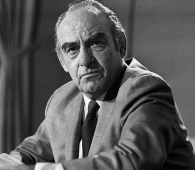
1970 – The bodies of dissident union leader Jock Yablonski, his wife, and daughter were discovered in their Clarksville, Pennsylvania, farmhouse by Yablonski’s son Kenneth. The family had been dead for nearly a week, killed on New Year’s Eve by killers hired by the United Mine Workers union leadership. Yablonski’s murder eventually brought down the whole union leadership and ended the widespread corruption of the union under UMW President Tony Boyle.
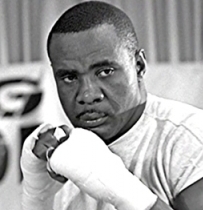
1971 – Former heavyweight boxing champion Sonny Liston’s body was discovered by his wife in their Las Vegas home. Authorities determined he had been dead for about a week. Although his death certificate stated he died of lung congestion and heart failure, many believe there was more to it than that. The Sheriff’s office found a quarter ounce of heroin in a balloon in Liston’s bedroom and to many, there is reason to think he accidentally overdosed on the drug.
Still others believe Liston was murdered. He was deeply involved as a bill collector in a loan-sharking ring in Las Vegas. When he tried to muscle in for a bigger share of the action, several close friends surmised that his employers got him very drunk, took him home, and stuck him with a needle.
1971 – The New Jersey Reds defeated the Harlem Globetrotters, 100-99, ending the Globetrotters’ 2,495 game winning streak.
The Reds (who played under several names; Boston Shamrocks, Baltimore Rockets, Atlantic City Seagulls, but most often, the Washington Generals) provided deliberately ineffective opposition as a foil for the Globetrotters. From 1953 until 1995, the Generals played exhibitions against the Globetrotters, winning only six games and losing more than 13,000.
Following the rare victory on this date, Reds’ owner Red Klotz described the fans’ reaction: “They looked at us like we killed Santa Claus.”
1972 – President Richard Nixon ordered the development of a Space Shuttle program. Designed to function more like a cost-efficient “reusable” airplane than a one-use-only rocket-launched capsules, the shuttle afforded NASA pilots and scientists more time in space with which to conduct space-related research. NASA launched Columbia, the first space shuttle, in 1981.
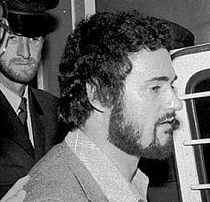
1981 – Police in England arrested Peter Sutcliffe, a truck driver later convicted of the “Yorkshire Ripper” murders of 13 women, and for attempting to murder seven more over a five year period (1975-1980).
At his trial, Sutcliffe pleaded not guilty to 13 counts of murder, but guilty to manslaughter on the grounds of diminished responsibility. The basis of his defense was his claim that he was the tool of God’s will. Sutcliffe claimed to have heard voices that ordered him to kill “prostitutes”. However, he was found guilty of murder on all counts and sentenced to life in prison.
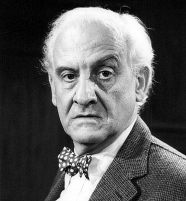
1982 – Actor Hans Conried (character actor, very active in voice-over roles and comedian, best known for providing the voice of Captain Hook in 1953s Peter Pan and for his work as Uncle Tonoose on Make Room For Daddy) died of a heart attack at the age of 64.
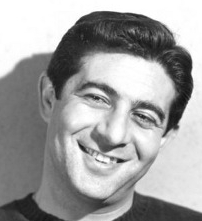
1982 – Actor Harvey Lembeck (Stalag 17 but best remembered for his role as Cpl. Rocco Barbella on The Phil Silvers Show {also known as Sgt. Bilko}, and as the stumbling, overconfident outlaw biker Eric Von Zipper in various beach party movies during the 1960s) died of a heart attack at the age of 58.
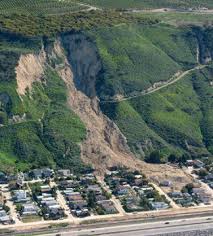
1982 – A series of landslides near San Francisco killed up to 33 people and closed the Golden Gate Bridge. In all, an amazing 18,000 different landslides took place in the San Francisco Bay Area following a very heavy rain storm.
Two fast-moving fronts carrying extremely heavy rain passed through San Francisco in a 36-hour period beginning on January 4, during which the area received an amount of rain equal to half its average annual precipitation. Some areas received as much as 24 inches of rain on January 4 and 5. On January 5, the rain began to trigger thousands of separate landslides in the Bay Area hills.
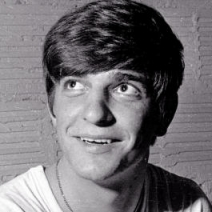
1988 – “Pistol Pete” Maravich collapsed and died at the age of 40 of heart failure while playing in a pickup basketball game. Maravich’s last words, less than a minute before he died, were “I feel great.”
The NBA Hall of Fame player is still the all-time leading NCAA Division I scorer with 3,667 points scored (in just 83 games!)and an average of 44.2 points per game. All of his collegiate accomplishments were achieved before the three-point line was introduced to NCAA basketball and despite being unable to play varsity as a freshman under then-NCAA rules.
1993 – Reggie Jackson was the sole eligible player elected to Major League Baseball’s Hall of Fame.
1993 – Following a 5-11 season, Mike Ditka was fired as Chicago Bears head coach. In his 11 seasons as head coach of the Bears, Ditka compiled a record of106-62, including a Super Bowl title.
1994 – Former House Speaker Thomas P. “Tip” O’Neill died in Boston at the age of 81. O’Neill entered politics in 1936 when he was elected to the Massachusetts House where he served until 1952. In 1953 he was elected to the U.S. House of Representatives as a Democrat and was voted Speaker of the House in 1977. He served in that duty until he retired in 1987.
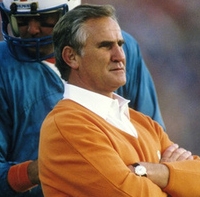
1996 – Miami Dolphins head coach Don Shula announced his retirement. That announcement ended one of the greatest coaching legacies in NFL history. He set numerous records in his 33 seasons as a head coach. He is first in most games coached (526), most consecutive seasons coached (33), most victories (347), and Super Bowl Appearances (6), appearing once with the Baltimore Colts and five times with the Dolphins.
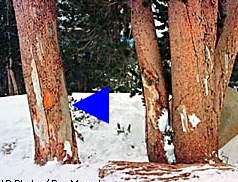
1998 – U.S. Congressman Sonny Bono died in a skiing accident. The 62-year-old Bono and his wife, Mary, were visiting the Heavenly Ski Resort, located on the Nevada-California border 55 miles south of Reno, Nevada. The accident occurred when Bono left his family to ski alone. He was reported missing several hours later, and his body was found that evening. Police said Bono had skied into a wooded area and hit a tree; the cause of death was massive head injuries. Strangely for what was called a ski accident, Bono had no smashed ribs, broken knees, neck trauma, or hand injuries that would have come from trying to ward off a collision with a tree. While the five-page autopsy report concluded that the death was caused by “craniocerebral injuries due to blunt force trauma,” other injuries detailed in the document included a black eye, swollen lips, bloody nose, bruised jaw, and two upper teeth knocked out, all on the right side of the head.
Former FBI special agent Ted Gunderson, after reviewing the findings, said, “The official version of Sonny Bono’s death is hogwash. It’s nonsense for anyone to now try to suggest that Bono died after crashing into a tree. Sonny was ambushed and viciously battered to death.”
1999 – Nolan Ryan, George Brett, Orlando Cepeda, and Robin Yount were elected to Major League Baseball’s Hall of Fame.
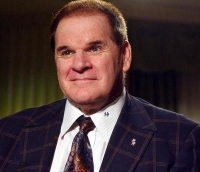
2004 – After 14 years of denials, Pete Rose finally admitted publicly to betting on baseball games and other sports while playing for and managing the Cincinnati Reds. He also admitted to betting on Reds games, but said that he never bet against his team.
Rose said he hoped his admissions would help end his ban from baseball so that he could reapply for reinstatement. It did not change anything. The all-time Major League leader in hits remains banned and is still ineligible for election to baseball’s Hall of Fame.

2004 – Former baseball player Frank Edwin “Tug” McGraw died of brain cancer at the age of 59. The father of country music’s Tim McGraw, Tug is best remembered for coining the phrase, “Ya Gotta Believe” which became a popular rallying cry for the 1974 New York Mets.
2007– Pittsburgh Steelers head coach Bill Cowher resigned. In Cowher’s 15 seasons as coach, the Steelers captured eight division titles, earned 10 postseason playoff berths, played in 21 playoff games, advanced to six AFC Championship games and made two Super Bowl appearances (winning one).
Compiled by Ray Lemire ©2015 RayLemire.com. All Rights Reserved.
You may not, under any circumstances, reproduce, record, publish, republish, post, transmit, publicly display, publicly exhibit or distribute any articles or photographs on RayLemire.com without obtaining the express written consent of the Operator.
